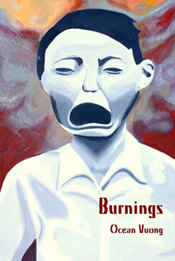Burnings by Ocean Vuong | Sibling Rivalry Press 2011 | $12.00
Ocean Vuong’s first chapbook of poetry, Burnings, is a searing elegy to a deceased motherland that continues to smolder in the memories of those who left her in the wake of war. Although Vuong is a member of the 1.5 generation (the children and infants of Vietnamese refugees with scant memories or no memories of that armed conflict) his writing boldly confronts, grapples with and reflects themes of personal and political dissolution and regeneration.
Do not say our names as this flame grows
from the edge of the photo, the women’s smiles
peeling into grimaces, the boy spreading slowly
into black smudge, filaments of fire
dissolving into wind. No, do not say our names.
Let us burn quietly into the lives
we never were.
[from “Burnings”]
What comes forth in the title poem is the shock of tangible, catastrophic loss. It gives you the feeling of being gradually burned down to a nub, leaving behind only a trail of stoic grief, and in order to get on in life and persevere you must transcend it.
An apt Mark Doty epigram divides Burnings into two sections, but the transformative medium of fire is the theme that runs throughout the chapbook. As I read Vuong’s poems, I imagined each one warping and crinkling in my hands, heating up my fingers, as if someone had lit a match at the corner of the page. The slow burn of Vuong’s verse and his juxtaposing and melding of life and death give off sparks in the dark that illuminate truths which one never truly forgets.
